|
|
|
Sort Order |
|
|
|
Items / Page
|
|
|
|
|
|
|
| Srl | Item |
| 1 |
ID:
136941


|
|
|
|
|
| Summary/Abstract |
Drawing from ethnographic work carried out between 2005 and 2007, this article considers the ways in which a women’s network has developed strategies to find meaning around the absences of loved ones, killed or ‘disappeared’ during the decades of conflict in Sri Lanka. For most of these women, the fate of their husbands, brothers, sons and fathers is not known and the lack of answers means that they are unable to fully grieve and find closure. In order to survive, they must find ways to deal with the absent bodies and present memories of those who may never be located and accounted for. These strategies include tree-planting ceremonies carried out as a way of not only remembering and mourning loved ones but also asking questions about how one makes sense of loss and what it means to carry the burden of unanswered absences through everyday life and into the future.
|
|
|
|
|
|
|
|
|
|
|
|
|
|
|
|
| 2 |
ID:
137030
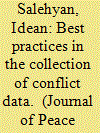

|
|
|
|
|
| Summary/Abstract |
Quality data is at the heart of all empirical research. Data collection on contentious politics, including civil war, terrorism, and protest has proceeded at a rapid pace over the last several years. This special section develops a set of best practices and offers advice to those involved in collecting conflict data as well as those who are regular users of such data. In this introduction, the process of data collection is considered, including source selection, information extraction or ‘coding’, and data sharing. A set of six rules is offered, which will hopefully guide others as they compile quantitative data on conflict processes.
|
|
|
|
|
|
|
|
|
|
|
|
|
|
|
|
| 3 |
ID:
135406
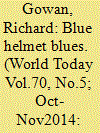

|
|
|
|
|
| Summary/Abstract |
UN peacekeepers are being killed in several conflict zones and need the world's support.
|
|
|
|
|
|
|
|
|
|
|
|
|
|
|
|
| 4 |
ID:
134940
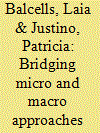

|
|
|
|
|
| Summary/Abstract |
This article reflects on the importance of linking micro and macro levels of analysis in order to advance our current understanding of civil wars and political violence processes and discusses the contributions of the articles in this special issue. We first identify the main problems in research on political violence that is focused on a single level of analysis and describe the challenges faced by research that attempts to establish connections between different levels. We then introduce the different articles in the special issue, with an emphasis on the micro–macro-level linkages they develop and highlighting their commonalities. We conclude by emphasizing the importance of a new research agenda for the study of civil wars and political violence that bridges social, economic, and political dynamics occurring at the local level and conflict processes taking place in the macro arena.
|
|
|
|
|
|
|
|
|
|
|
|
|
|
|
|
| 5 |
ID:
135129


|
|
|
|
|
| Summary/Abstract |
Eastern Antioquia, Colombia—In late 2001, Sandra Mira was kidnapped while riding a bus with her six-year-old daughter through rural Colombia. Paramilitaries in camouflage uniforms stopped the bus and forced both to disembark. They tied up Sandra, then returned her daughter to the bus. When the girl arrived in San Carlos, the town where the family lived, she asked someone to call her grandmother, Pastora Mira.
|
|
|
|
|
|
|
|
|
|
|
|
|
|
|
|
| 6 |
ID:
135339


|
|
|
|
|
| Summary/Abstract |
Anarchy was coming to Africa, Robert Kaplan warned in 1994, and a surge in conflict initially seemed to confirm that prediction. With less fanfare, however, after the year 2000, conflict in Africa declined, probably to the lowest levels ever. Recent fighting in Libya, Mali, South Sudan and elsewhere has prompted a new wave of ‘Africa falling apart’ concerns. This article reviews the history and data of conflict in Africa, from pre-colonial times to the present. Historical comparison and quantitative analysis based on the Uppsala Conflict Data Program (UCDP) and Major Episodes of Political Violence (MEPV) datasets on the 1961–2013 period show that Africa has experienced a remarkable decline in warfare, whether measured in number of conflicts or fatalities. Warfare is a relatively low risk to the lives of most Africans. The years 2010–2013 saw an increase of 35 per cent in African battle deaths over 2005–2010, but they still are 87 per cent lower than the 1990–1999 average. Changes in external support and intervention, and the spread of global norms regarding armed conflict, have been most decisive in reducing the levels of warfare in the continent. Consequently, there is no Africa exception to the systemic shift towards lower levels of armed conflict.
|
|
|
|
|
|
|
|
|
|
|
|
|
|
|
|
| 7 |
ID:
136216


|
|
|
|
|
| Summary/Abstract |
Malthus’s privileging of population growth as the main cause of poverty, scarcity and war still resonates widely in both the public policy arena and popular culture. It shapes dominant discourses about the relationship between climate change, conflict and security in Africa. This article examines what I call the Malthusian Anticipatory Regime for Africa (MARA). MARA represents the convergence of current international strategies for reducing high fertility in sub-Saharan Africa through long-acting female contraception with climate conflict narratives that blame environmental degradation on population pressure and portray young African men as a security threat. Together these serve as a powerful gendered rationale for Western humanitarian and military interventions. MARA also plays a role in justifying the new land enclosures on the continent. How can critical scholarship more effectively challenge MARA and intervene in the politics of anticipating the future?
|
|
|
|
|
|
|
|
|
|
|
|
|
|
|
|
| 8 |
ID:
136575


|
|
|
|
|
| Summary/Abstract |
The author describes the importance of school–family relations in establishing a culture of religious tolerance among pupils of a state senior secondary school in the multicultural city of Palangkaraya, Central Kalimantan. Palangkaraya is a provincial capital city, and is home to different ethnicities and religions. In 2001, a massive ethnic riot erupted between the local Dayak and emigrant Madurese in Sampit, a district in Central Kalimantan province, and quickly spread to other districts, including Palangkaraya. This conflict was regarded as a national tragedy and took hundreds of lives. In this post-conflict context, the author examines how several related aspects of school – culture, curriculum and instruction, politics and policies, and school–community relations – contribute to the school's efforts to nurture religious tolerance among students. The data were derived from the author's ethnographic fieldwork in 2010 employing participant observation, focus group discussions and in-depth interviews with the principal, teachers and students. The findings suggest that students have acquired an embodied cultural capital of religious diversity and tolerance from families and community, and that this has equipped them to help create a 'tolerance culture' in the school, despite the unsupportive school politics and inconsistent school policies related to religious diversity. On their own initiative and, to a lesser extent, inspired by the formal curriculum, religion teachers play a pivotal role in shaping students' understanding of religious diversity and tolerance through deliberate teaching about some aspects of other religions.
|
|
|
|
|
|
|
|
|
|
|
|
|
|
|
|
| 9 |
ID:
136170
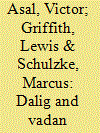

|
|
|
|
|
| Summary/Abstract |
For classes which contain a discussion of strategy, war, political violence, terrorism, insurgency, peace operations, or ethno-nationalist conflict to name a few, students must have an effective, foundational understanding of the complexities of using military force. To that end, we have developed an operational “battlefield” exercise, the Dalig–Vadan Exercise (DVE), which allows an entire class of students to get a sense of the dynamics and complexities of command and execution of competing strategies without any military background, any particular emphasis on time, place, or context, and de-emphasizing the consequences of violence. Anchored on Clausewitz's friction and fog, the DVE provides students with a first-person encounter with decision making in a dynamic, multiparty, informational-limited, and time-sensitive environment that can be related to a wide range of courses and course material in international relations and related fields.
|
|
|
|
|
|
|
|
|
|
|
|
|
|
|
|
| 10 |
ID:
134702


|
|
|
|
|
| Summary/Abstract |
This article argues that socio-political responses of Scheduled Castes in Jammu and Kashmir do not neatly fit into the category of “Dalit assertion.” Rather than simply prioritizing their caste concerns, Scheduled Castes manifest a diversified and ambiguous response, especially as they engage with the conflict-centered political discourse of the state.
|
|
|
|
|
|
|
|
|
|
|
|
|
|
|
|
| 11 |
ID:
136448


|
|
|
|
|
| Summary/Abstract |
At a time of increasing attention to the issue of wartime sexual violence, the 2012 Human Security Report (HSR 2012) sought to expose perceived biases in the mainstream narrative. HSR 2012 raised questions about the prevalence of wartime sexual violence, whether this form of violence was increasing or decreasing, the identity of perpetrators and victims, the state of evidence-based research and its challenges, and the policy implications of such analyses. While some of HSR 2012’s findings have been widely accepted, many of the report’s inferences are problematic. This paper uses HSR 2012 as a primary source to ask why narratives about sexual violence matter; why closely examining the report’s narrative, in particular, is important; and how we can be more reflective about what we can and do know about wartime sexual violence, given the opportunities and limitations of conducting research in this field.
|
|
|
|
|
|
|
|
|
|
|
|
|
|
|
|
| 12 |
ID:
134234


|
|
|
|
|
| Summary/Abstract |
On a single day in July, when ambient tensions escalated, Palestinian militants fired more than 180 rockets into Israel, and the Israelis launched airstrikes against towns throughout the Gaza Strip. Dozens of Palestinians, most of them civilians, were killed. The order of daily urban life was disrupted, yet again, by warfare.
|
|
|
|
|
|
|
|
|
|
|
|
|
|
|
|
| 13 |
ID:
134683


|
|
|
|
|
| Summary/Abstract |
This article examines Lebanon’s political dynamics in the context of the 2011 Arab protest wave, and seeks to integrate events in the small republic within the broader literature written on the contagion effects of the uprisings. It argues that the uprisings’ trajectories provide a terrain to better understand Lebanon’s politics of sectarianism and their interactions with the region’s upheavals. The article focuses on analyzing how power-sharing along sectarian lines exacerbates conflict while hampering collective action and democratic advances.
|
|
|
|
|
|
|
|
|
|
|
|
|
|
|
|
| 14 |
ID:
135908


|
|
|
|
|
| Summary/Abstract |
Energy systems can be an integral part of the initiation of insurgencies and revolutions. Their quality and reliability may be causative factors in some instances and contributory factors in others. Energy systems are systems within systems nested in other systems, so the effect of an attack on a fuel source or parts of an energy system may have more far reaching effects than initially expected. This article will look at various energy systems and fuels, as well as some of the systems attached to them, including communications, transportation, water, and food. It will also look at examples of attacks on energy systems and why they may occur and by whom during times of conflict. There is a discussion of how a country could use energy to help reduce the chances of further conflict in the initial post-conflict environment. Energy policy options for a government wishing to stay in power, both pre- and post-conflict, are presented.
|
|
|
|
|
|
|
|
|
|
|
|
|
|
|
|
| 15 |
ID:
136513
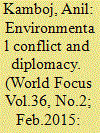

|
|
|
|
|
| Summary/Abstract |
As the global population continues to rise, and the demand for resources continues to grow, there is significant potential for conflicts over natural resources to intensify in the coming decades. At least eighteen violent conflicts have been fuelled by the exploitation of natural resources since 1990. Recent research suggests that over the last sixty years at least forty per cent of all intrastate conflicts have a link to natural resources. Civil wars such as those in Liberia, Angola and the Democratic Republic of Congo have centred on "high-value" resources like timber, diamonds, GOLD, minerals and oil. Some conflicts have involved to control scarce resources such as fertile land and water.
|
|
|
|
|
|
|
|
|
|
|
|
|
|
|
|
| 16 |
ID:
135402


|
|
|
|
|
| Summary/Abstract |
Moscow’s annexation of Crimea and its perceived intervention in the eastern Ukraine conflict has led to it being hit with several rounds of western sanctions. More are in the pipeline with the United States and Europe developing a sanctions regime with multiple gears that can be engaged in reponse to Russia’s actions.
The targets of these sanctions are varied: individuals have been hit with travel bans and have seen their assets frozen; banks and companies with close ties to the Kremlin, have seen their access to longer term finance restricted; and sales have been restricted to parts of the economy, including the high-tech, military and oil sectors.
|
|
|
|
|
|
|
|
|
|
|
|
|
|
|
|
| 17 |
ID:
135176
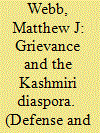

|
|
|
|
|
| Summary/Abstract |
Grievance theories that emphasize injustice as the primary cause of secessionist violence offer valuable insights into the motivations of sponsors and participants. However, they face a difficulty in explaining the participation and support of geographically dispersed populations of co-ethnics (diaspora) that is not shared by rival theories that instead emphasize self-interest. This article uses the Kashmiri diaspora in Britain to examine how appeal to nationalist factors of shared identity, mutual sympathy and common understandings might allow grievance theories to effectively explain diaspora support. It concludes that, while a hybrid grievance-nationalist model might offer a more accurate and nuanced explanatory account of secessionist violence, it does so at the cost of conceptual clarity. Finally, the article addresses the implications for states and strategies to reduce the mobilization of diaspora in order to deny secessionists’ valuable assistance.
|
|
|
|
|
|
|
|
|
|
|
|
|
|
|
|
| 18 |
ID:
135869


|
|
|
|
|
| Summary/Abstract |
The fall of Mosul in June of 2014 was followed in July by the establishment of a self-proclaimed Caliphate by the Islamic State of Abu Bakr al-Baghdadi. Since then, the Islamic State has continued to expand its operations, persistently pushing into Sunni-dominated parts of Iraq and Syria, nearly defeating the Kurds of Iraq, and moving against the Kurds of Syria, in Kobani, as well as army units of the Syrian state. By doing so, it has maintained an astonishingly high tempo of operations and has shown itself capable, agile and resilient. It has also proved itself to be adept at utilizing social media outlets, and in pursuing brutal tactics against civilians and prisoners that have been aimed at shocking adversaries—potential or actual—and observers both in the region and beyond. The rise of the Islamic State poses a challenge not only to the security of Iraq and Syria, but to the state system of the Middle East. Western powers have been drawn into a conflict in a limited fashion—through air strikes and advising ground forces; the UK, while engaging slightly later than other countries against the Islamic State, has followed this pattern, though targeting Islamic State forces solely in Iraq. This article considers the nature and scale of the threat posed by the Islamic State, and assesses three possible areas of further policy engagement that they UK may, or may have to, follow.
|
|
|
|
|
|
|
|
|
|
|
|
|
|
|
|
| 19 |
ID:
136184
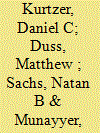

|
|
|
|
|
| Summary/Abstract |
There have been six Nobel peace prizes given for the Arab-Israeli conflict. In 1950, Ralph Bunche got it for negotiating the armistice. In 1978, Anwar Sadat and Menachem Begin received it for negotiating Camp David. In 1994, Arafat, Rabin and Peres got it for negotiating the Oslo accords. Then Carter got a Nobel Prize in 2002 for a variety of reasons, including the work that he did on the Arab-Israeli peace talks.
|
|
|
|
|
|
|
|
|
|
|
|
|
|
|
|
| 20 |
ID:
137059


|
|
|
|
|
| Summary/Abstract |
Is there a relationship between leadership change and the probability of conflict termination in civil war? This article uses an original data set on the leaders of rebel groups combined with existing data on state leaders to determine whether leadership change in states or rebel groups affects the probability that a civil war will end. Three results emerge: (1) when the leader of a rebel group is captured or killed, wars are 398 percent more likely to end, (2) conflicts are less likely to end while rebel groups are being led by their founder, and (3) the leader of a state that presided over the beginning of the conflict is significantly more likely to bring the conflict to an end than a replacement leader. The results are robust to the use of matching techniques and other tests of endogeneity.
|
|
|
|
|
|
|
|
|
|
|
|
|
|
|
|
|
|
|
|
|